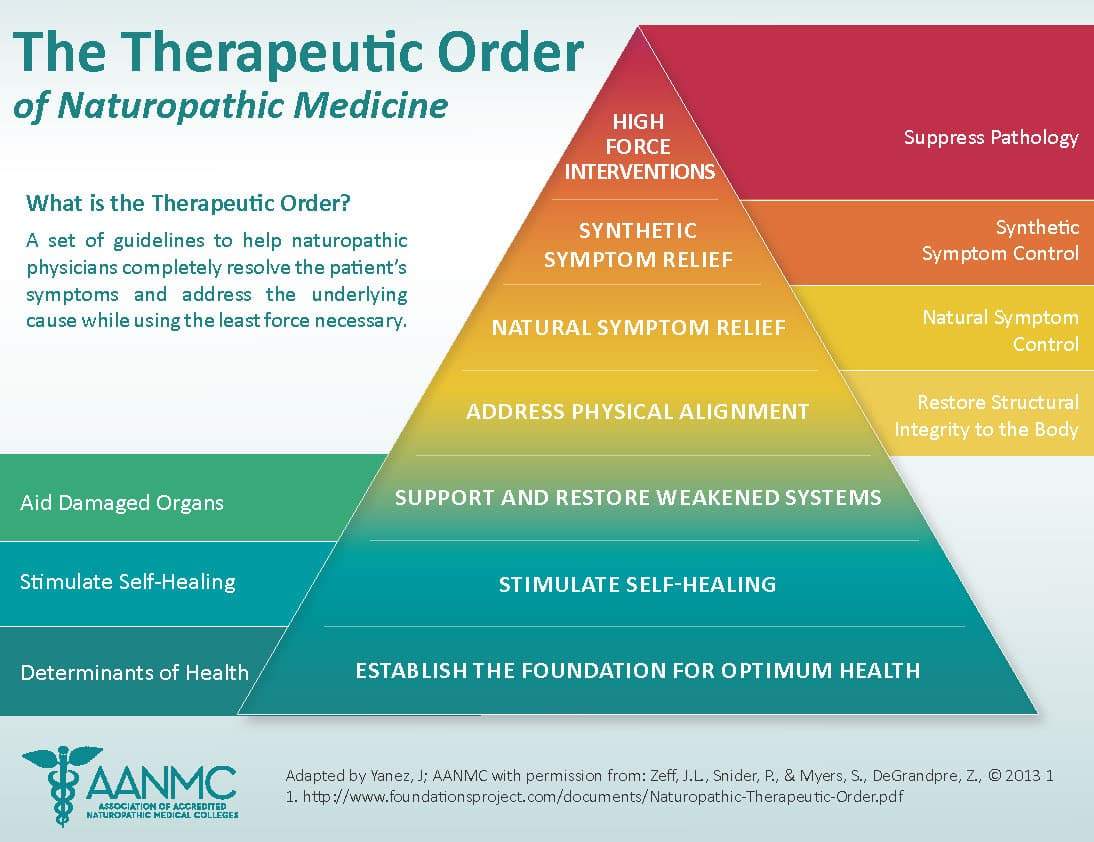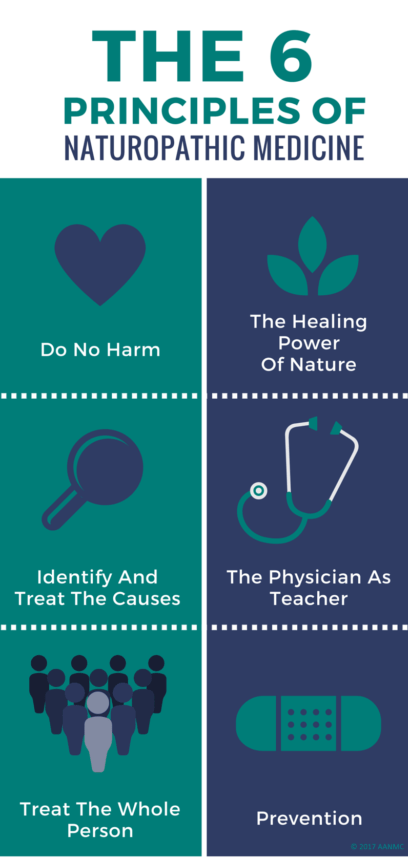Naturopathic medicine is a distinct health care profession that combines the wisdom of nature with the rigors of modern science. Naturopathic doctors (NDs) are trained as primary care providers who diagnose, treat and manage patients with acute and chronic conditions, while addressing disease and dysfunction at the level of body, mind and spirit.
NDs concentrate on whole patient wellness through health promotion and disease prevention, while addressing the underlying cause of the patient’s condition. Naturopathic physicians care for patients of all ages and genders, and practice in settings ranging from private clinics to integrative medical centers, urgent care clinics and hospitals. NDs are clinicians, authors, scholars, researchers and entrepreneurs, and are increasingly in demand across numerous industries.
They provide individualized, evidence-informed therapies that balance the least harmful and most effective approaches in order to help facilitate the body’s inherent ability to restore and maintain optimal health. Naturopathic doctors are experts in natural medicine, and naturopathic medical education is the most efficient and direct way to train as a primary care doctor who specializes in natural medicine.

What Does a Naturopathic Doctor Do?
Naturopathic Doctors are primary care providers who can diagnose, treat, and manage patients who suffer from a range of symptoms and conditions. NDs approach patient treatment by addressing the root cause of symptoms from a whole-person lens, focusing on body, mind, and spirit. Naturopathic doctors also focus on prevention and the body’s natural ability to heal itself. Collaboration and teaching patients how to take charge of their own health are important aspects of naturopathic medicine. Naturopathic Doctors collaborate with their patients to create individualized treatment plans that address diet, lifestyle, and mental wellness in order to achieve positive health outcomes.
What Guides the Practice of Naturopathic Medicine?
The practice of naturopathic medicine is driven by a set of guiding principles and an oath administered to all ND graduates. The intention of these is to ensure a unified medical practice that prioritizes the body, mind, and spirit.
Developed in 1997 by US-based naturopathic doctors, the Therapeutic Order of Naturopathic Medicine is a set of guidelines designed to aid NDs in addressing patients’ health concerns in the least invasive way possible. The Therapeutic Order focuses on whole-person health and identifying the root cause in order to resolve the underlying issue and/or relieve symptoms.
The Naturopathic Doctors Oath
The Naturopathic Doctors’ Oath ties all naturopathic doctors together by declaring their intention to follow the six principles of naturopathic medicine and dedicate themselves to helping people through the practice of naturopathic medicine. All ND graduates are administered the oath, which guides their future career in naturopathic medicine.
The Six Principles of Naturopathic Medicine
Naturopathic doctors are united in the Six Principles of Naturopathic Medicine. Not only an oath, the Principles are the foundation of naturopathic medical education and naturopathic patient care. ND practice is planted firmly in the assumption that it is vital to treat the individual, to stimulate and support the body’s inherent ability to heal, to identify the root cause, address it as naturally and gently as possible, to teach patients how to create wellness, and to prevent illness whenever possible.
The Therapeutic Order builds upon the Six Principles to further guide the clinical practice of naturopathic medicine, and emphasizes the determinants of health as an integral component of the care plan. NDs are afforded a broad spectrum of therapies, ranging from nutrition and lifestyle counseling to supplements, pharmaceuticals and minor surgical procedures, however the Therapeutic Order promotes selection of the least forceful intervention when safely indicated.
A Little History on Naturopathic Medicine
The origin of naturopathic medicine as an organized profession in North America dates to European doctors in the 1600s and 1700s who incorporated herbal medicine and traditional therapies and ultimately their legacy made its way here. Modern-day naturopathic medicine also emphatically embraces multicultural holistic practices that are integral to so many countries and cultures across the globe. Additionally, ND programs work hand-in-hand with leading research institutions to grow the body of evidence supporting natural therapies.
The term ‘naturopathy’ was formally codified in North America and attributed to Dr. Benedict Lust. Dr. Lust founded the American School of Naturopathy in New York in 1902. By the 1920s naturopathic practice acts were increasing across North America, but the commissioned Flexner Report codified conventional allopathic medicine as the primary method of training and healthcare delivery. After WWII, demand for naturopathic education was on the decline as surgical and pharmaceutical therapies grew in stature and demand, and training programs for conventional medicine grew.


In the 1970s, a resurgence in naturopathic healing resulted in rapid growth and maturation of the naturopathic profession to where it is today. Public demand has continued to grow for the many natural therapies and root cause-based approaches core to naturopathic practice. Access to naturopathic doctors has been expanded through increased insurance coverage and legislative recognition. The profession is poised to continue to grow and provide evidence-informed natural therapies to the masses.
Core to the maturation of the profession are solid educational standards which include the AANMC Clinical Competencies of the Graduating Naturopathic Student, institutional and programmatic accreditation that is recognized by the United States Department of Education and consistent regulatory requirements for licensure. The Council on Naturopathic Medical Education (CNME) is the only accrediting body recognized by the United States Department of Education for naturopathic programs. Graduates of CNME accredited naturopathic medical institutions are eligible to sit for the Naturopathic Physicians Licensing Examination (NPLEX) or the College of Naturopaths of Ontario (CONO) professional examination, the passage of which is required for licensure.
Learn More About Becoming a Naturopathic Doctor
Receive information from the accredited schools of your choice located across North America!



